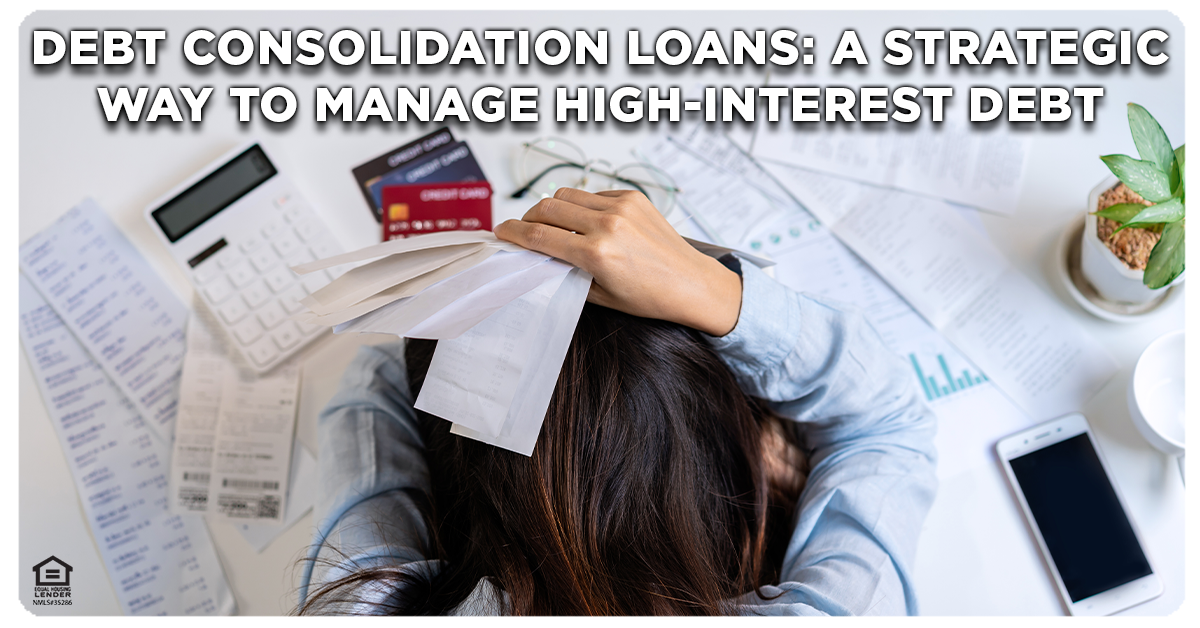
Debt Consolidation Loans: A Strategic Way to Manage High-Interest Debt

Americans' total credit card debt currently stands at a record-breaking $1.166 trillion.
Over the last few years, the balance has surged by $396 billion, marking a 51% increase since the first quarter of 2021. This surge in credit card debt is part of an ongoing trend, as consumer debt levels have risen steadily to the highest level of credit card debt recorded since the Fed began tracking this data in 1999.
For many families, their home is their largest asset, with over 70% of their personal wealth tied up in their property.
With that in mind, a critical question arises: Should you consider a refinance to help consolidate your high-interest debt?
Should You Refinance to Consolidate Your Debt?
Refinancing your mortgage to consolidate debt can be an effective way to manage high-interest balances. A well-structured debt consolidation loan could significantly reduce the overall payments you make, helping you pay off your debt faster.
While it’s true that many homeowners are holding onto historically low mortgage rates, refinancing can still offer compelling benefits. Even if you give up your current low mortgage rate, consolidating your debt could reduce your overall household payments by combining them into a single, lower-interest payment.
Consider a Debt Consolidation Loan to Pay Off High-Interest Debt
Mortgage rates are generally much lower than the interest rates associated with credit cards and other unsecured loans, so a popular way to consolidate debt is by opting for a cash-out refinance. By tapping into your home’s equity, you can access cash to pay off high-interest debts like credit card balances, personal loans, or medical bills.
A cash-out refinance allows you to take your existing mortgage and replace it with a new loan for a larger amount. The difference between your original mortgage and the new loan amount is then given to you in cash, which you can use to pay off your high-interest debts.
For example, if you have a $100,000 principal loan balance on your mortgage and an additional $20,000 in credit card debt, a cash-out refinance would involve taking on a new mortgage of $120,000. Your lender would provide you with $20,000, and you could use that money to pay off your credit cards, leaving you with just one mortgage payment at a lower interest rate.
Using Your Home Equity to Consolidate Your Debt
Home equity is the portion of your home’s value that you truly own. As you make payments on your mortgage, you gradually build equity, which you can leverage for debt consolidation.
In a cash-out refinance scenario, you essentially replace your current mortgage with a new one for a higher amount, using the equity in your home to pay down high-interest debt. The new loan consolidates your obligations, and you’re left with a single, often lower-interest monthly payment.
What is a HELOC?
A Home Equity Line of Credit (HELOC) is another option for homeowners looking to consolidate debt. A HELOC is similar to a credit card in that it allows you to borrow money against your home’s equity, but with the flexibility to borrow and repay over time.
With a HELOC, you have a credit limit based on the amount of equity in your home, and you can withdraw funds as needed, up to your credit limit. A HELOC can be a versatile tool for managing debt, as it allows you to pay off high-interest loans or credit cards, as well as fund home improvements, medical expenses, or other major purchases.
Access Your Home’s Equity Quickly
For many Americans, their home is their largest asset, with over 70% of personal wealth tied up in property. Unfortunately, traditional methods of accessing home equity, like selling your home or taking out a second mortgage, can be difficult, costly, and time-consuming.
A cash-out refinance or a HELOC offers an alternative by allowing you to tap into your home’s equity without having to go through the lengthy process of selling or applying for a second mortgage. These methods can give you quicker access to cash, allowing you to address high-interest debt, make major purchases, or take care of other financial needs in a more efficient manner.
Closing Thoughts
With rising credit card balances and increasing debt levels across the nation, debt consolidation loans are becoming an important tool for many homeowners.
Whether through a cash-out refinance or a HELOC, utilizing the equity in your home can help you lower interest rates, reduce monthly payments, and streamline your debt obligations.
Before making any decisions, it’s important to weigh the pros and cons of each option to determine the best approach for your unique situation. Give us a call or visit us online for a free home financing consultation today.